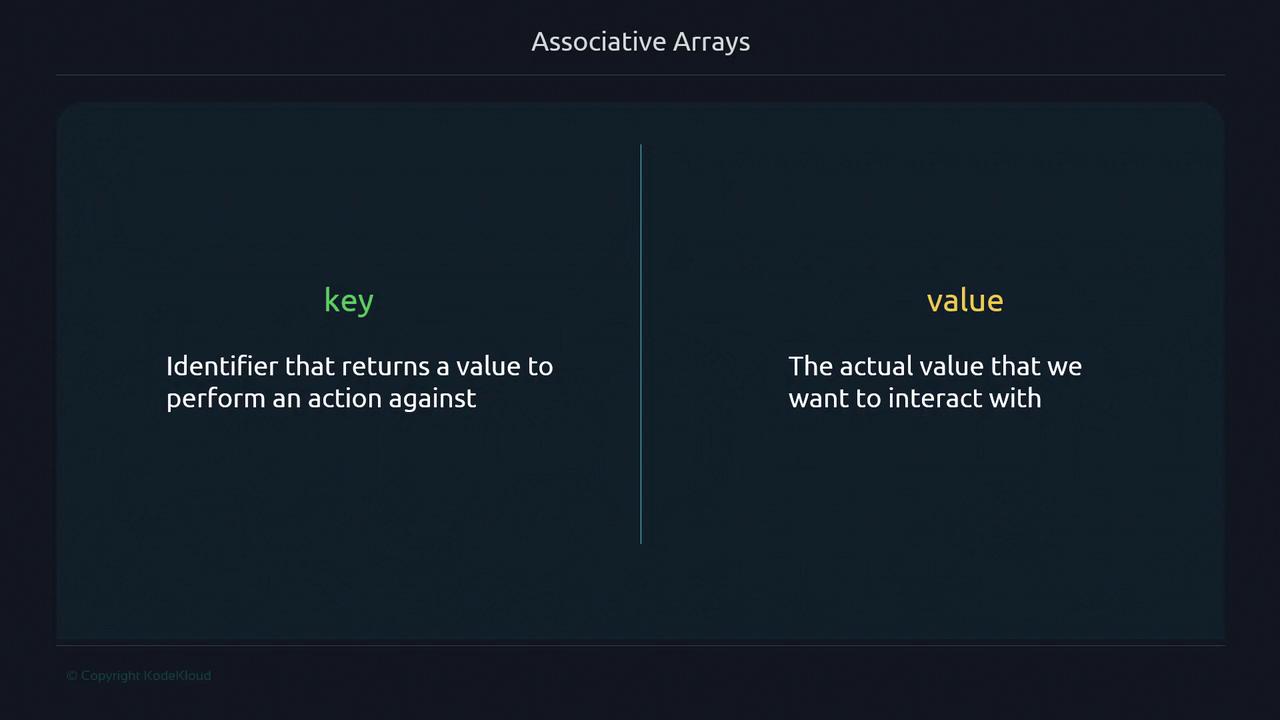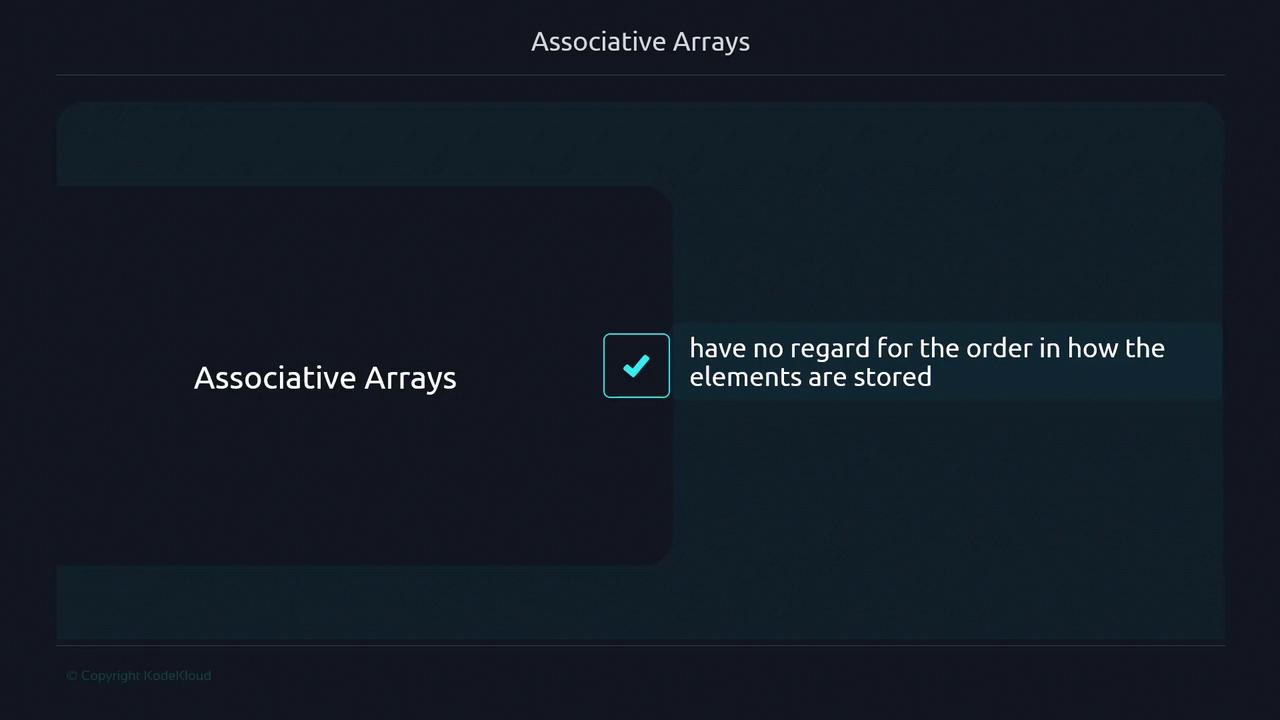Advanced Bash Scripting
Arrays
Associative
In this tutorial, you will explore associative arrays in Bash—powerful data structures that use named keys for direct value lookup. By the end, you’ll understand how to declare, access, modify, and iterate over associative arrays in your scripts.
Indexed Arrays vs. Associative Arrays
Think of indexed arrays as a numbered chest of drawers (0-based), and associative arrays as labeled drawers you open by name.
| Array Type | Indexing Method | Declaration |
|---|---|---|
| Indexed Array | Numeric, 0-based | declare -a arr=(...) |
| Associative Array | String-based keys | declare -A arr=(...) |
Example: Indexed Array (Socks Analogy)
#!/usr/bin/env bash
declare -a chest_drawer=("shirts" "sports clothing" "socks" "jeans")
echo "${chest_drawer[2]}"
$ ./socks.sh
socks
Checking Your Bash Version
Associative arrays require Bash 4.0+. Verify with:
$ echo $BASH_VERSION
5.2.15(1)-release
Warning
If your Bash version is older than 4.0, associative arrays won’t work. Please upgrade before continuing.
Declaring and Accessing an Associative Array
Use declare -A to define an associative array. Here’s how to store and retrieve “socks” by key:
#!/usr/bin/env bash
declare -A chest_drawer=(
["shirts"]="T-Shirts and polo shirts"
["sports"]="All sorts of Sports Clothing here"
["socks"]="Formal and everyday socks"
["jeans"]="Jeans, and some casual dress shorts"
)
echo "${chest_drawer["socks"]}"
$ ./associative-v1.sh
Formal and everyday socks
Analogy: Emergency Contacts
Store quick-dial numbers by department name:
#!/usr/bin/env bash
declare -A emergency_contacts=(
["Fire Department"]="555-0001"
["Police Department"]="555-0002"
["Hospital"]="555-0003"
)
echo "${emergency_contacts["Fire Department"]}"
$ ./emergency.sh
555-0001
Key-Value Pair Concept
Associative arrays map keys (identifiers) to values (data).
Note
In Bash associative arrays, each key is unique and case-sensitive: "Mark" ≠ "mark".

Example: Email Addresses
#!/usr/bin/env bash
declare -A email_addresses=(
["Mark"]="[email protected]"
["Kriti"]="[email protected]"
["Feng"]="[email protected]"
)
echo "${email_addresses["Mark"]}"
$ ./email-1.sh
[email protected]
Adding New Elements
Assign a key in square brackets to insert or append:
#!/usr/bin/env bash
declare -A email_addresses=(
["Mark"]="[email protected]"
["Kriti"]="[email protected]"
["Feng"]="[email protected]"
)
# Add more contacts
email_addresses["Andy"]="[email protected]"
email_addresses["Rajasekar"]="[email protected]"
echo "${email_addresses[@]}"
$ ./email-3.sh
[email protected] [email protected] ...
Note
Associative arrays are unordered; iteration order can vary.

Replacing a Value
Overwrite an existing key to update its value:
#!/usr/bin/env bash
declare -A email_addresses=(
["Mark"]="[email protected]"
["Kriti"]="[email protected]"
["Feng"]="[email protected]"
["Rajasekar"]="[email protected]"
)
echo "Before: ${email_addresses[@]}"
email_addresses["Feng"]="[email protected]"
echo "After: ${email_addresses[@]}"
$ ./email-4.sh
Before: [email protected] ...
After: [email protected] ... [email protected]
Removing Elements
Use unset to delete by key or clear the entire array:
#!/usr/bin/env bash
declare -A email_addresses=( ... )
# Remove one element
unset email_addresses["Kriti"]
# Remove all elements
unset email_addresses
Listing Keys vs. Values
- Keys:
${!array[@]} - Values:
${array[@]}
#!/usr/bin/env bash
declare -A email_addresses=( ... )
echo "Keys: ${!email_addresses[@]}"
echo "Values: ${email_addresses[@]}"
Iterating with a for Loop
Loop through keys and access each value:
#!/usr/bin/env bash
declare -A email_addresses=( ... )
for key in "${!email_addresses[@]}"; do
echo "$key's email is ${email_addresses[$key]}"
done
$ ./email-8.sh
Kriti's email is [email protected]
...
Enclose "${!email_addresses[@]}" in quotes to handle multi-word keys correctly.
Links and References
Watch Video
Watch video content